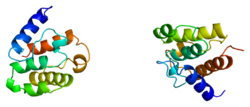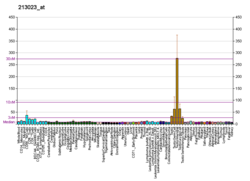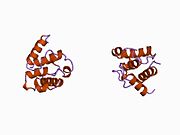Utrophin is a protein that in humans is encoded by the UTRN gene.
The protein encoded by this gene is a component of the cytoskeleton. Utrophin was found during research into Duchenne's muscular dystrophy. The name is a contraction for ubiquitous dystrophin. The 900 kb gene for utrophin is found on the long arm of human chromosome 6. Utrophin was discovered due to its homology with dystrophin. It was found by screening a peptide containing the C-terminal domain of dystrophin against cDNA libraries. The homology varies over its full length from less than 30% in regions of the central rod structural domain to 85% (identity 73%) for the actin binding domain.
The tertiary structure of utrophin contains a C-terminus that consists of protein–protein interaction motifs that interact with dystroglycan, a central rod region consisting of a triple coiled-coil repeat, and an actin-binding N-terminus.
In normal muscle cells, utrophin is located at the neuromuscular synapse and myotendinous junctions. It is necessary for normal membrane maintenance, and for the clustering of the acetylcholine receptor. In adult humans, utrophin RNA is found ubiquitously, as the name implies, being abundant in the brain, kidney, liver, lung, muscle, spleen and stomach. In the human fetus during muscle differentiation, utrophin is found at the sarcolemma. It disappears when the fetus begins to express dystrophin.
Utrophin expression is dramatically increased in patients with Duchenne's muscular dystrophy (and female carriers), both in those muscle fibers lacking dystrophin and in rare, revertant fibers that express dystrophin.
No reports have yet associated mutation in the utrophin gene with disease, but it does not seem to play a critical role in development, since mice without utrophin develop normally.
See also
Further reading
-
Haenggi T, Fritschy JM (2006). "Role of dystrophin and utrophin for assembly and function of the dystrophin glycoprotein complex in non-muscle tissue" (PDF). Cell. Mol. Life Sci. 63 (14): 1614–31. doi:10.1007/s00018-005-5461-0. PMID 16710609. S2CID 8580596.
-
Khurana TS, Watkins SC, Kunkel LM (1992). "The subcellular distribution of chromosome 6-encoded dystrophin-related protein in the brain". J. Cell Biol. 119 (2): 357–66. doi:10.1083/jcb.119.2.357. PMC 2289652. PMID 1400579.
-
Tinsley JM, Blake DJ, Roche A, et al. (1993). "Primary structure of dystrophin-related protein". Nature. 360 (6404): 591–3. Bibcode:1992Natur.360..591T. doi:10.1038/360591a0. PMID 1461283. S2CID 4233655.
-
Love DR, Morris GE, Ellis JM, et al. (1991). "Tissue distribution of the dystrophin-related gene product and expression in the mdx and dy mouse". Proc. Natl. Acad. Sci. U.S.A. 88 (8): 3243–7. Bibcode:1991PNAS...88.3243L. doi:10.1073/pnas.88.8.3243. PMC 51422. PMID 2014247.
-
Buckle VJ, Guenet JL, Simon-Chazottes D, et al. (1990). "Localisation of a dystrophin-related autosomal gene to 6q24 in man, and to mouse chromosome 10 in the region of the dystrophia muscularis (dy) locus". Hum. Genet. 85 (3): 324–6. doi:10.1007/BF00206755. PMID 2203673. S2CID 23466676.
-
Love DR, Hill DF, Dickson G, et al. (1989). "An autosomal transcript in skeletal muscle with homology to dystrophin". Nature. 339 (6219): 55–8. Bibcode:1989Natur.339...55L. doi:10.1038/339055a0. PMID 2541343. S2CID 4366298.
-
Belkin AM, Burridge K (1995). "Localization of utrophin and aciculin at sites of cell-matrix and cell-cell adhesion in cultured cells". Exp. Cell Res. 221 (1): 132–40. doi:10.1006/excr.1995.1360. PMID 7589238.
-
Ahn AH, Kunkel LM (1995). "Syntrophin binds to an alternatively spliced exon of dystrophin". J. Cell Biol. 128 (3): 363–71. doi:10.1083/jcb.128.3.363. PMC 2120343. PMID 7844150.
-
Belkin AM, Burridge K (1995). "Association of aciculin with dystrophin and utrophin". J. Biol. Chem. 270 (11): 6328–37. doi:10.1074/jbc.270.11.6328. PMID 7890770.
-
Pearce M, Blake DJ, Tinsley JM, et al. (1994). "The utrophin and dystrophin genes share similarities in genomic structure". Hum. Mol. Genet. 2 (11): 1765–72. doi:10.1093/hmg/2.11.1765. PMID 8281135.
-
Ahn AH, Freener CA, Gussoni E, et al. (1996). "The three human syntrophin genes are expressed in diverse tissues, have distinct chromosomal locations, and each bind to dystrophin and its relatives". J. Biol. Chem. 271 (5): 2724–30. doi:10.1074/jbc.271.5.2724. PMID 8576247.
-
Bonaldo MF, Lennon G, Soares MB (1997). "Normalization and subtraction: two approaches to facilitate gene discovery". Genome Res. 6 (9): 791–806. doi:10.1101/gr.6.9.791. PMID 8889548.
-
Guo WX, Nichol M, Merlie JP (1997). "Cloning and expression of full length mouse utrophin: the differential association of utrophin and dystrophin with AChR clusters". FEBS Lett. 398 (2–3): 259–64. doi:10.1016/S0014-5793(96)01216-1. PMID 8977119. S2CID 45699698.
-
Deconinck AE, Rafael JA, Skinner JA, et al. (1997). "Utrophin-dystrophin-deficient mice as a model for Duchenne muscular dystrophy". Cell. 90 (4): 717–27. doi:10.1016/S0092-8674(00)80532-2. PMID 9288751. S2CID 115277.
-
Nawrotzki R, Loh NY, Ruegg MA, et al. (1999). "Characterisation of alpha-dystrobrevin in muscle" (PDF). J. Cell Sci. 111 (17): 2595–605. doi:10.1242/jcs.111.17.2595. PMID 9701558.
-
Keep NH, Norwood FL, Moores CA, et al. (1999). "The 2.0 A structure of the second calponin homology domain from the actin-binding region of the dystrophin homologue utrophin". J. Mol. Biol. 285 (3): 1257–64. doi:10.1006/jmbi.1998.2406. PMID 9887274.
-
Wilson J, Putt W, Jimenez C, Edwards YH (1999). "Up71 and up140, two novel transcripts of utrophin that are homologues of short forms of dystrophin". Hum. Mol. Genet. 8 (7): 1271–8. doi:10.1093/hmg/8.7.1271. PMID 10369873.
-
Blake DJ, Hawkes R, Benson MA, Beesley PW (1999). "Different dystrophin-like complexes are expressed in neurons and glia". J. Cell Biol. 147 (3): 645–58. doi:10.1083/jcb.147.3.645. PMC 2151186. PMID 10545507.
-
Keep NH, Winder SJ, Moores CA, et al. (2000). "Crystal structure of the actin-binding region of utrophin reveals a head-to-tail dimer". Structure. 7 (12): 1539–46. doi:10.1016/S0969-2126(00)88344-6. PMID 10647184.
|
PDB gallery
|
|---|
1bhd: SECOND CALPONIN HOMOLOGY DOMAIN FROM UTROPHIN
1qag: Actin binding region of the dystrophin homologue utrophin
|
External links









